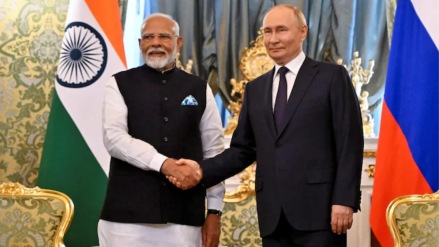India and Russia have taken a significant step towards strengthening their economic ties by agreeing to establish a national currency settlement system. Roman Babushkin, Chargé d’Affaires of the Russian Embassy, described Prime Minister Narendra Modi’s recent visit to Russia as “historic and game-changing,” emphasizing the importance of the bilateral discussions in Moscow.
“Russia is the fourth largest trading partner of India, and we have a very optimistic scenario that we will continue our successful and mutually beneficial partnership with India,” Babushkin stated.
He highlighted the Joint Statement’s focus on the establishment of the settlement system, aimed at boosting bilateral trade, with both nations targeting US$100 billion by 2030.
During his visit, PM Modi engaged in delegation-level talks and one-on-one discussions with President Vladimir Putin, primarily focusing on economic aspects. Babushkin noted the rapid growth in trade between India and Russia, particularly in energy, following Western sanctions imposed on Russia after its actions in Ukraine in February 2022.
The discussions also addressed concerns over Indian nationals fraudulently enlisted in the Russian armed forces and deployed on the Russia-Ukraine border. Babushkin assured that these individuals would be repatriated soon, affirming that Russia does not seek Indian participation in its military operations.
Regarding Ukraine, Babushkin criticized the recent peace conference in Switzerland as a “tamasha” (charade) and stressed Russia’s stance on Ukraine’s neutrality and non-alignment. He argued that including Russia’s proposals in the peace process is essential for achieving lasting peace in the region.
Babushkin also criticized Western support for Ukraine since the conflict began, highlighting a shifting global order where countries like India and Russia are emerging as independent centers of power. He defended Russia’s partnership with China as aligned with national interests, contrasting it with Western calls to decouple from Chinese products while importing them.
In regional affairs, Babushkin discussed Russia’s view of the Taliban as a nationalist force focused on Afghanistan, contrasting them with more significant threats posed by groups like the Islamic State-Khorasan Province. He suggested potential cooperation with the Taliban against external terrorist threats.
The agreements reached during Modi’s visit mark a significant step in India-Russia relations, enhancing economic cooperation and addressing geopolitical challenges. The establishment of a national currency settlement system is expected to streamline trade and investment flows, further solidifying the strategic partnership between the two nations.
